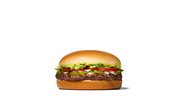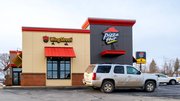Article
White Castle: Keeping it in the family
Regional brand finds success by maintaining tight control.

November 17, 2008
*Click here to view a slideshow of a reimaged White Castle store and the company's headquarters.
Regional burger chain White Castle has found success by remaining a family-owned company that holds tight control over operations yet still plays up its national reputation for its steam-grilled burgers, nicknamed Slyders.
The company was founded in 1921 by the late E.W. "Billy" Ingram and Walt Anderson, who sold his interest to Ingram a few years later. Ingram's grandson E.W. "Bill" Ingram III is now chairman, CEO and president.
 |
Twelve Ingram family members are involved in White Castle operations. Shown here are, from left, Dave Rife, plant manager of PSB Co. in Columbus, Ohio; John Kelley, VP, training and human resources; Lisa Ingram, VP, restaurant operations; and Brad Rife, general manager of White Castle food products. |
Eleven other Ingram family members are involved in company operations, including Bill Ingram's daughter, Lisa, who is vice president of restaurant operations.
Lisa Ingram, 38, didn't plan a career in the family business, she said, but a few years out of college she changed her mind.
"When you're young you think a certain way, and when you get a little older you think about things differently," she said.
Ingram started in the marketing department in 1997, left to get her MBA, and has been with operations since completing it.
While the Columbus, Ohio-based company does routinely review its business model, staying family owned is one of the brands strengths, she said.
"We really have felt that remaining company owned has allowed us to have a couple of advantages: we can grow at the pace that we want to, we can maintain our uniqueness and we can maintain our ability to look at different products and make decisions for the longer term," Ingram said.
Controlled growth
Slow and steady seems to be the company's motto as it expands in its existing Midwest and Northeast markets as well as a limited number of new ones, opening about 10 stores a year. To date, the company operates 415 units.
Despite numerous requests, the company does not franchise its stores.
Maintaining company control is also the reason White Castle makes its own buns and burgers for its restaurant — as well as the fixtures behind the counter. PSB Co., a White Castle wholly owned subsidiary originally founded as a way to prefabricate the chain's stores, specializes in manufacturing stainless steel fixtures and equipment not only for White Castle but for a variety of manufacturers as well.
Growing company loyalty John Kelley, cousin to Lisa Ingram and Brad and Dave Rife, is vice president of training and human resources for the company, said that quality control extends to the chain's team members. For example, White Castle offers benefits beyond that of most QSRs to install company loyalty. The chain offers health and life insurance to its full-time employees, as well as profit sharing, pension plans (for employees 21 and older) and longevity bonuses to all employees. At the end of 2007, White Castle had nearly 11,000 employees in its restaurant division. Turnover at the hourly level was 100 percent, well below the QSR industry average of 161 percent in 2007. HR efforts to boost employee morale include flexible scheduling, cross training for all restaurant staff, a regular employee newsletter to highlight regional accomplishments and a promote-from-within policy. But most of all, Rife said, it's the work atmosphere that keeps the turnover down and the numbers in the 25-year club growing. (The company honors those with 25 or more years of continuous service.) "As a family, we really try and make sure that we do everything we can to get that family atmosphere out into all our plants and restaurants," Rife said. |
QSR benefits
--People Report |
Dave Rife, 46, cousin to Lisa Ingram and plant manager of PSB in Columbus, Ohio, said that the company's manufacturing of its own griddles and back-of-house fixtures offers flexibility since it can customize items to fit each location's footprint.
"Plus, we know what goes on behind our counter better than anybody else, so it allows us to focus on developing equipment that best suits our needs instead of in general," he said.
Sticking with success
Research helps the company keep a finger on customers' pulse and changing tastes. While other brands have tried to add better-for-you products to their menus, White Castle's menu continues to focus on burgers and fried foods.
One new item the company is testing is a pulled pork barbecue sandwich. Ingram said tests are going well, and she hopes the product can add variety to the menu and please customers who may not like the brand's burgers.
While Ingram did say the company is continuously looking at new menu items, she wouldn't say if the company was considering better-for-you items. Customer tastes are of primary concern.
"We do a lot of testing with our customers to see if they like this product . . . what they'll buy and if it fits in with our brand," Ingram said.
White Castle does have some stores in the New York area, which has instituted menu labeling requirements. Ingram said the brand has provided nutritional information to customers for more than 15 years and is not sure whether posting caloric information is affecting sales, especially in light of current economic challenges.
"We really haven't seen a change," Ingram said. "There are so many different things going on, it's hard to isolate one particular variable. It's hard to say that it's one thing or the other. (But) our product's small so that gives us an advantage because the portion size allows us to have that information and not be overwhelming."
Frozen product line extends brand's reach
In the 1980s, White Castle restaurants routinely made, froze and shipped burgers to expatriate customers, particularly on the West Coast. Rather than licensing the sandwiches for another company to produce, in 1986 the company created White Castle Distributing (WCD) to make and sell frozen hamburgers and cheeseburgers in retail grocery stores.
The company now has two frozen food plants, located in Kentucky. A line of frozen menu items — from burgers to chicken sandwiches — is sold in grocery stores, c-stores and vending machines in all but five states.
According to company data, in 2007 White Castle sold nearly 590 million burgers combined in its stores and through its frozen food line.
Brad Rife, Dave Rife's brother, 43, is general manager of White Castle food products and oversees the frozen food division. He said the frozen products not only provide fans outside of the brand's region an opportunity to get the same product as in the restaurants but also introduces the brand to new customers.
Jamie Richardson, vice president of government and shareholder relations for the privately held company and husband to an Ingram great-granddaughter, said that quality control is imperative to the brand's success.
| ||||||||||||||||||
"We're very fastidious about quality and understand that when we put our name on it, that's a stamp of trust that we're asking others to engage with and embrace," Richardson said.
The company also capitalizes on its national reputation earned by fans who are willing to go out of their way for its burgers.
"We do get stories about customers traveling an hour, two hours, even overnight to get our product because it's so unique, and you can't find it anywhere else," Ingram said.
White Castle recognizes its customers who have gone to great lengths to obtain the chain's infamous Slyders with the Cravers Hall of Fame. To honor the many couples who have shared stories about having their first date at the restaurant, the chain's stores cover the tables with white cloths and take reservations on Valentine's Day.
The message that comes across loud and clear through those stories, Ingram said, is that customers want the company's burgers to stay the same.
"The hamburgers, the cooking process and how we make the hamburgers is truly the hallmark of our success," she said.
White Castle company headquarters: Columbus, Ohio
Subsidiaries: White Castle Distributing LLC, which produces frozen product line for retail and PSB Co., which specializes in manufacturing stainless steel fixtures and equipment. The company also operates three bakery sites and three meat plants.
Stores: 415, all company owned.
Co-branded stores: 27 White Castle locations in three states are co-branded with Church's Chicken.
Employees: (at the end of 2007) 11,630, including 10,785 in the restaurant division. Of those, 500 have 25 or more years with the company, and more than 2,000 have more than 10 years continuous service.
Latest revenue figures: The privately owned company released the following: consolidated net sales year-end 2007 $613 million, restaurant division net sales $540 million, and average gross sales per unit $1.3 million annually.
The Slyder: 100 percent USDA inspected beef in a 2 ½-inch square patty with five evenly spaced holes steam-grilled on a bed of onions and served on a soft, white bread bun with single dill pickle slice.
Number of hamburgers sold in 2007 (restaurants and WCD combined): 589.9 million.
Brand rival: Chattanooga, Tenn.-based Krystal has a similar-type burger and nearly 400 restaurants in the South and Southeast.
 ChatGPT
ChatGPT Grok
Grok Perplexity
Perplexity Claude
Claude









